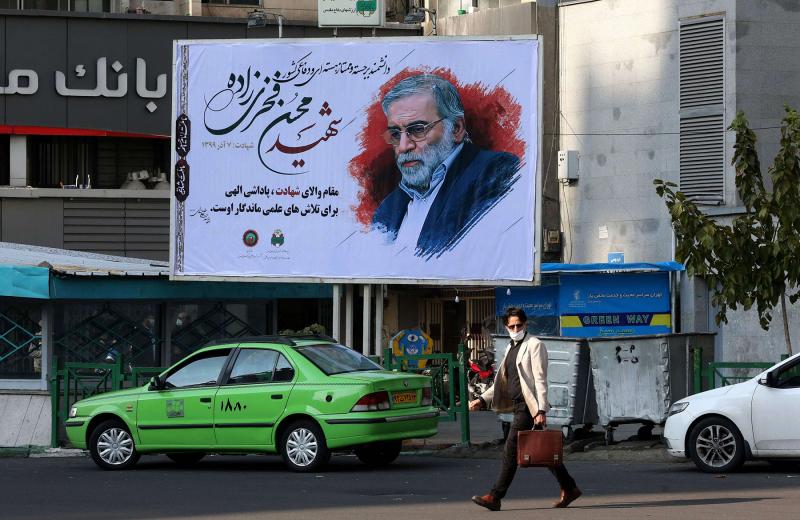IN THE MEDIA
We are at a pivotal moment for addressing the Iranian nuclear threat
December 15, 2020 | Ahron Shapiro

Canberra Times, Dec. 15 2020
Taken on face value, the November 27 assassination of top Iranian nuclear scientist Mohsen Fakhrizadeh, like the targeted killing of Islamic Revolutionary Guard Corps commander Qassem Soleimani last January, would appear to be aimed at breaking the momentum of Iranian aggression in the region by striking at the operational nexus of its overt conventional and illicit unconventional offensive capabilities.
That is not to say there are not differences. Unlike the US attack on Soleimani, no country has taken credit for the hit on Fakhrizadeh, although many assume Israeli intelligence may have had a hand.
Even so, some pundits suggest that the motive for the latest move was not the obvious one, but instead to make it harder for US President-elect Joe Biden to return to the 2015 Joint Comprehensive Plan of Action (JCPOA) nuclear deal.
This theory, it must be said, seems very unlikely.
As veteran US Middle East envoy Dennis Ross tweeted on November 30, “One can debate the logic of killing of Mohsen Fakhrizadeh. But to argue it was done to frustrate the incoming Biden administration ignores reality. Such an operation takes extensive planning, having operatives on the ground, actionable intelligence. It can’t be spur of the moment.”
Fakhrizadeh, a Revolutionary Guard officer and his country’s top nuclear weapons strategist, was no research academic, but the veteran chief scientist behind one of the world’s most infamous illegal nuclear weapon development programs, as well as an officer in a body which many countries regard as a terrorist organisation. He was therefore a very legitimate military target.
Even the UN’s nuclear watchdog, the International Atomic Energy Agency (IAEA), named Fakhrizadeh in a December 2015 report as the mastermind of Project Amad in the early 2000s, involved in “activities … in support of a possible military dimension to (Iran’s) nuclear programme”.
Aware of this, Iran kept Fakhrizadeh in the shadows. In 2015, before the JCPOA was signed, the IAEA had attempted to interview all of the Iranians involved in the Amad program. However, the Iranian regime refused the IAEA any access to Fakhrizadeh.
Though Project Amad was suspended in late 2003, Fakhrizadeh later established its successor, the Organization of Defensive Innovation and Research, known by its Farsi acronym SPND, whose activities continue today.
In 2015, Iran committed to reveal all of its nuclear research and nuclear sites. Yet documents pertaining to weapons development in the Iranian nuclear archive recovered by Israeli intelligence in 2018 – as well as the very existence of the archive itself – proved that Iran never intended to fully comply with the deal.
This is one of the many reasons why President-elect Biden campaigned on “improving and extending” the original nuclear deal – because the ease by which Iran bypassed the limitations imposed on it by the JCPOA can neither be ignored nor forgotten.
According to the IAEA, Iran’s enriched uranium stockpiles are currently 12 times greater than the cap allowed under the nuclear deal and climbing – enough for two nuclear weapons, according to analysts at the Institute for Science and International Security. Last month, Iran also added to its list of JCPOA violations, enriching uranium using the proscribed next-generation IR-2m centrifuges in its Natanz underground facility.
All told, Iran has lowered its estimated “breakout” time needed to produce a nuclear weapon to approximately three months, compared to the full year that the JCPOA was supposed to provide.
This is the sort of behaviour which Iran’s regime is notorious for. In 1979, Iran’s Islamist revolutionaries embraced hostage-taking as a political strategy, holding 52 US embassy personnel for 444 days in what became known as the Iran hostage crisis. In recent times, British-Australian academic Kylie Moore-Gilbert endured an imprisonment approaching twice as long before her release last month – apparently in exchange for the release of three convicted Iranian terrorists held in Thailand.
Should Iran cross the nuclear threshold, it would have the tools to hold the world hostage to its radical agenda, with little recourse.
Whether or not Iran can somehow be coaxed back to compliance to the existing deal is beside the point. The sunset clauses of the JCPOA mean that, in a few short years, the world will have to revisit the Iranian nuclear issue – except that Iran will have had time to perfect and advance centrifuge, ballistic missile and other technologies necessary for rapid weaponisation, making the challenge much harder.
We therefore stand today at a pivotal crossroad. US President Donald Trump’s “maximum pressure” policy has left Biden and his chosen secretary of state Tony Blinken with a strong hand of strategic cards to play, in the form of crippling sanctions, for their announced plans to force Tehran into a serious and comprehensive renegotiation.
As part of America’s inner circle of allies, Australia should do its part to encourage the Biden administration to play these strategic cards carefully and conservatively. It should not squander the second chance it has been given to improve and extend the Iranian nuclear deal to be much more effective and comprehensive. And the new administration can undertake this vital task armed with the important lessons about Iran’s intentions, capabilities and vulnerabilities that have been learned over the past five years.
If it does not succeed, it cannot be assumed there will be a third chance to do so.





